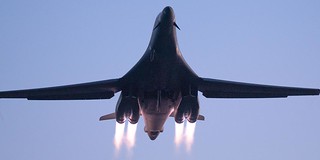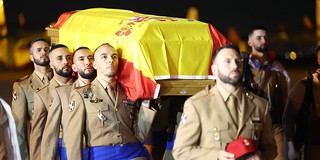The heroism of two medics who helped 80 wounded American and German soldiers
Throughout history, military medics have been the protagonists of some incredible but rarely remembered feats.
The story of Desmond Doss (1919-2006) is well known, who refused to fight for his Christian beliefs but enlisted as a medic, saving 75 American soldiers in the Battle of Okinawa (1945), risking his life and being wounded several times, a heroism for which he received the Medal of Honor. His life was recounted in the film "Until the last man" (2016). Much less well known is another heroic story: that of military doctors Robert E. Wright and Kenneth J. Moore, of the 2nd Battalion of the 501st Parachute Infantry Regiment of the 101st Airborne Division of the US Army, the famous "Screaming Eagles".

They set up an aid station inside a church
Like thousands of paratroopers from that Division and the 82nd Airborne Division, Robert and Kenneth parachuted into Normandy in the early morning of June 6, 1944. Following international law, being military doctors, both were unarmed. Robert made landfall half a kilometer north of the town of Angoville-au-Plain, with about 80 inhabitants and located 16 kilometers from Utah Beach, one of the landing points for US troops .
Upon reaching the town, Robert saw the tower of the Church of San Cosme and San Damiano and went there, placing the Red Cross flag that he carried with him on the side of the church and establishing a post there. relief. Kenneth also saw the church tower and headed towards it. The two military medics began working together to treat the incoming wounded. Those who were not going to survive were placed behind the altar, in the place closest to the tabernacle. They used a nearby fountain to obtain water and clean the wounds of those who were arriving.

The miracle of the mortar shell that did not explode
Robert and Kenneth did not limit themselves to remaining inside the church, but used a wheelbarrow to rescue wounded from the battlefield, risking their lives in doing so, because although due to their military merits they were protected by the Geneva Convention, it was a dangerous place where they had to dodge shots. In their aid work, the two doctors did not discriminate: they helped both American soldiers and German soldiers, because for them, regardless of their uniform, only those they had to treat were wounded.
The most dangerous moment occurred when a mortar shell fell inside the church, but miraculously it did not explode, limiting itself to cracking one of the tiles on the floor of the church. If he had detonated, surely everyone who was there would have died.

Germans and Americans respected the neutrality of that church
On the night of June 6-7, the Americans had to abandon Angoville-au-Plain before a German counterattack. The two military doctors decided to stay in the church, despite the risk of being captured by the Germans. Shortly after the Americans left the town, a German officer entered the church and saw that there were wounded from both sides sheltering there. Surely moved by this, the German officer decided to respect the neutrality of that sacred place, and some German soldiers even helped bring more wounded on stretchers to the church.

On June 7, the Americans returned to the town and fighting resumed. A US Army officer wanted to establish an observation point in the church tower, but Robert and Kenneth opposed it and demanded to respect the neutrality of the aid station just as the Germans had done. The American officer agreed to his request. Angoville-au-Plain was finally liberated by the Allies on June 8, allowing the wounded to be evacuated. Robert and Kennet were awarded a Silver Star for their feat. In those two days they helped 80 wounded soldiers, including a dozen Germans, and a local boy. Both continued their work during such difficult times as the Battle of the Bulge.

Their lives after World War II
After the war, Robert married and had two children. A devout Christian, he worked in charitable endeavors of the Methodist Church, helping to build houses for the poor. He passed away on December 21, 2013, at the age of 89. At his request, his ashes were transferred outside the Angoville-au-Plain church where he helped those 80 wounded soldiers. Kenneth also married and had three children. He worked for oil companies and was survived by his wife and two of his children. He passed away on December 7, 2014, at age 90.
The memory of these two heroes in Angoville-au-Plain
On June 6, 2011, Rober was awarded the Legion of Honor by the French Republic, the highest decoration of that country, in an act that included the participation of American, French and German soldiers. In front of the Church of Saint Cosme et Saint Damien in Angoville-au-Plain, which still preserves on its pews the bloodstains of those wounded (and the tile broken by the impact of the mortar shell that did not explode), there is a monument dedicated to the two military doctors, in which this text appears next to their names: "For the humane and saving attention to 80 combatants and one child".

Likewise, inside the church, a stained glass window recalls the names of the two doctors together with this quote from the Gospel of Saint John: "Greater love have no one than this, that he lay down his life for his friend."
This Friday, the channel Yarnhub published an excellent video about the history of Robert and Kenneth in that Normandy church:
---
Bibliography:
- "Remembering D-Day: The Eagles of Mercy". Fidan Baycora, HistoricAmerica.org.
- "Wright Robert E.", American War Memorials Overseas.
- "Moore Kenneth Jack", American War Memorials Overseas.
- U.S. Department of Defense.
---
Main image: Yarnhub.
|
Don't miss the news and content that interest you. Receive the free daily newsletter in your email: |
- Most read
- US F-35A fighters flying with Polish F-16s over Poland at a time of great tension
- The brutal 'touch and go' of a Lufthansa Boeing 747 at Los Angeles Airport
- The deployment of Spanish soldiers of the Regulars and BRILAT near Russian territory
- Eurofighter vs F-35: the opinions of professional pilots on these advanced fighters
- The Harrier IIs of the Spanish Navy fly with F-16 and F-4E of the Hellenic Air Force
- The firearms used by the Pontifical Swiss Guard, the smallest army in the world
- Sierra Army Depot, a huge United States base with hundreds of Abrams tanks stored

 ES
ES







Opina sobre esta entrada: